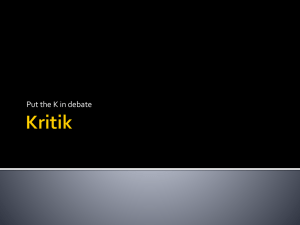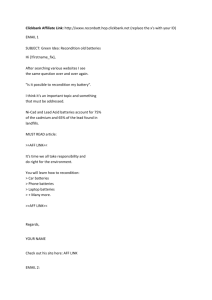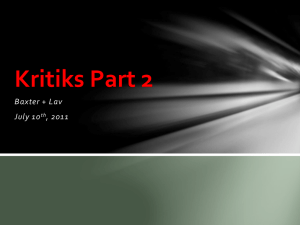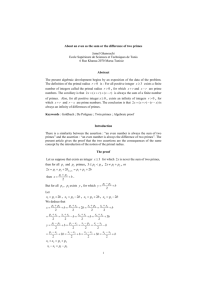NDI 2013 Sophs Theory COPT lab Conditionality Bad
advertisement
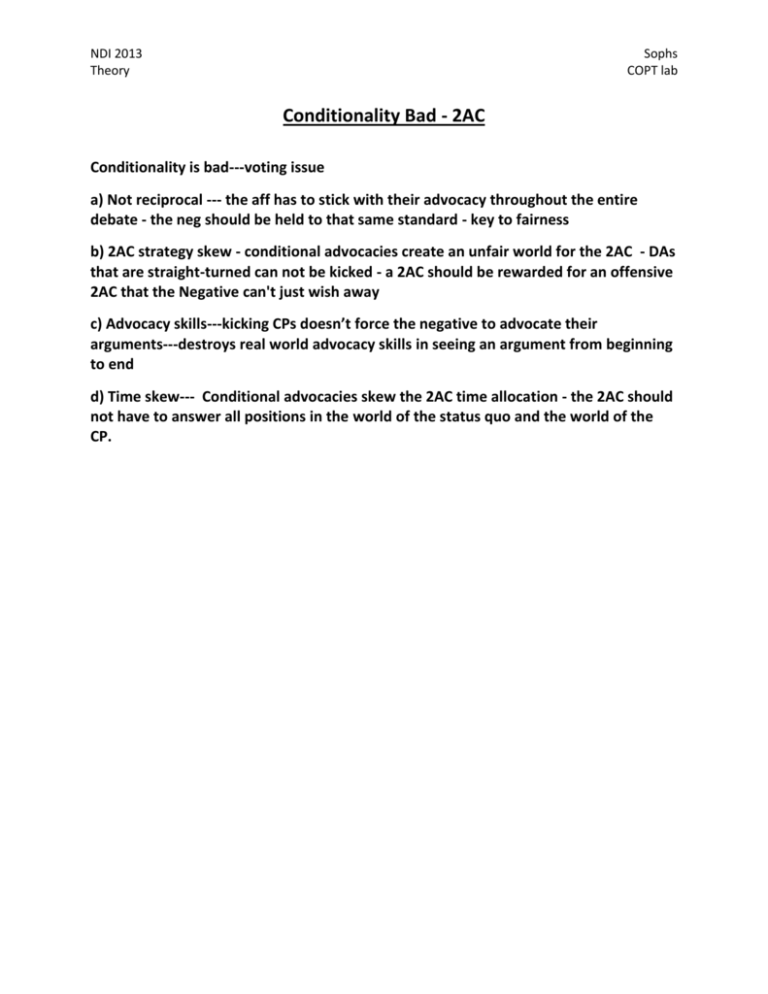
NDI 2013 Theory Sophs COPT lab Conditionality Bad - 2AC Conditionality is bad---voting issue a) Not reciprocal --- the aff has to stick with their advocacy throughout the entire debate - the neg should be held to that same standard - key to fairness b) 2AC strategy skew - conditional advocacies create an unfair world for the 2AC - DAs that are straight-turned can not be kicked - a 2AC should be rewarded for an offensive 2AC that the Negative can't just wish away c) Advocacy skills---kicking CPs doesn’t force the negative to advocate their arguments---destroys real world advocacy skills in seeing an argument from beginning to end d) Time skew--- Conditional advocacies skew the 2AC time allocation - the 2AC should not have to answer all positions in the world of the status quo and the world of the CP. NDI 2013 Theory Sophs COPT lab Conditionality Good Conditionality is good--Counter-Interpretation ---the negative gets one conditional CP and one conditional K alt Offense--a) Negation Theory balances side bias--aff get inherent advantages like 1st and last speech and infinite prep---condo is key to balance those advantages---key to reciprocity b) Increases Aff critical thinking---the aff learns to pick their strongest arguments in the 2AC from each possible angle - narrowing down to one argument at the end of the debate gives us more in-depth education on those arguments c) Increases Neg critical thinking - allowing the Negative the opportunity to choose between the status quo and the advocacy as the debate progresses increases decisionmaking skills and forces the weighing of strategic option as the arguments are developed - leads to more educated debaters and better thinkers Defense a) All arguments are conditional - the Affirmative can kick advantages, Topicality does not have to be in the 2NR - CPs are just one of the possible negative tests of the Affirmative advocacy b) Time skew inevitable---some teams are just faster than others, and condo CPs aren’t any different than not going for topicality in the block or 2NR c) Reject the arg, not the team NDI 2013 Theory Sophs COPT lab International Fiat Bad - 2AC International fiat bad---voting issue a) Not reciprocal---the aff gets one actor---the USFG---but the neg gets an almost infinite amount if they can select a country, combination of countries, or international organizations - debate should have a fair playing field b) Poor topic education --- allowing the Negative to choose from a close to infinite number of actors focuses the debate on shallow actor claims instead of the action to Latin American - depth comes before breadth for education c) Not real world---the judge is a USFG policy maker---only has the jurisdiction to decide whether the USFG should or shouldn’t do the plan - a policy-maker does not have the ability to choose another actor to do his/her action d) Skews the 2AC - it is impossible for the 2AC to be able to generate offense against every potential international actor. This CP allows for an unfair research burden for the Aff. NDI 2013 Theory Sophs COPT lab International Fiat Good International fiat is good--C/I---the negative gets one cohesive actor that currently engages the affirmative’s country in the status quo - solves your predictability claims Offense: a) Increases education---gives us foreign policy education about other international actors within the literature base - also allows us to learn more about the governmental workings of foreign governments b) Key test of USFG in the resolution - key to reciprocity due to inherent aff advantages like first and last speech c) Increases Critical thinking---forcing the Aff to have US key warrants make for better, more in-depth debates - narrows down the field of potential topic Affs and forces the debate to be about a clash of actor comparisons Defense: a) Real world is arbitrary ---the judge doesn’t have to be a USFG lawmaker---they just need to decide what the best option is - a decision-maker can always say it is best if someone else does the decision b) Search for the best policy option - debate is about clash over the best policy option for a decision-maker. That search gets gutted if we put artificial constraints on it, such as not testing the actor. b) Reject the arg, not the team-- at worst, the CP is a test of the Affirmative and is not a reason to reject the team. If the CP is considered unfair, reject the argument, not the team. NDI 2013 Theory Sophs COPT lab Consult CPs Bad - 2AC Consultation CPs are bad---voting issue a) Skews 2AC offense ---the CP is a moving target because they can claim a minor change to the plan after the consultation - impossible for the Affs to predict the changes to generate offense against the CP - minor modifications justifies Perm: Do the plan and consult on enforcement so the advocacy is stable. b) Research burden - consultation CPs justify consulting an infinite number of actors, which is also unpredictable - makes it impossible for the Aff to research offense against each possible actor or combination of actors c) You stole all of our Aff ---consult CPs are plan encompassing CPs, which destroy fairness because the aff should have the right to leverage parts of the plan against the CP c) Artificially competitive---competing off of immediacy and certainty isn’t really competition- the Negative created a world to force a net-benefit - they redefined fiat - CP is competitively just plan plus - justifies Perm: Do the CP NDI 2013 Theory Sophs COPT lab Consultation CPs Good Consultation CPs are good: Counter-interpretation - the negative gets one process CP grounded in the literature Offense: a) Increases education on foreign affairs --debating the consultation CP increases education related to the topic, such as what other countries think about economic engagement with Latin America - it is one of the only true advocacy tests where we learn about foreign government interactions b) Real world---when policymakers consider a plan, they make sure that actors that are involved are considered before it is implemented - enhances our learning about real-world decision-making c) Search for the best policy option - policy debate is about the in-depth search of the best policy option - we will win the CP competes due to certainty and immediacy examining the process of the policy options are key to that search Defense: a) Lit checks abuse---the fact that the CP is grounded in the topic literature mitigates all of their offense on predictability b) The CP is competitive---it competes off of certainty and immediacy, as well as procedurally, because in the process of consultation, parts of the plan are changed c) Reject the arg, not the team
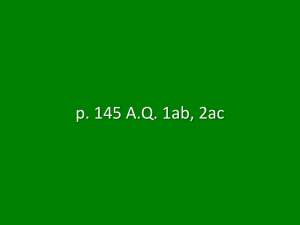
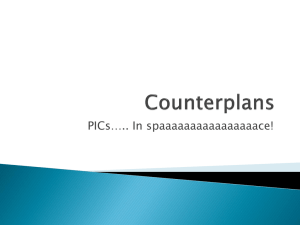
![advanced cp theory]](http://s2.studylib.net/store/data/005381128_1-1c81f7fcca4a0bd051a0840b6002170d-300x300.png)
